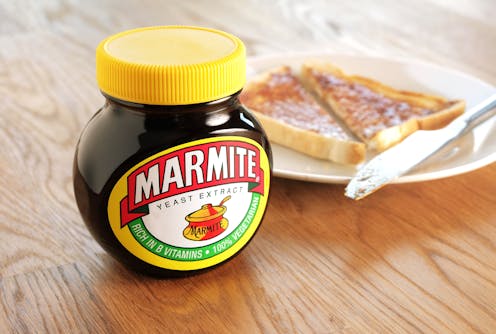why the maker of Marmite is feeling the squeeze
- Written by John Colley, Professor of Practice, Associate Dean, Warwick Business School, University of Warwick

As a major manufacturer of well known cleaning products, it is perhaps fitting that events at Unilever have started to resemble something of a corporate soap opera. In the last few weeks there has been increased pressure at the top, a failed merger attempt, backlash from investors, and an announcement of major job cuts.
Prior to all of this, the British company’s share price has made little progress over the last five years[1].
The embattled chief executive, Alan Jope, responded in late 2021 with a failed £50 billion bid[2] for the consumer division of the pharmaceutical giant Glaxo Smith Kline (GSK), where brands include Panadol and Sensodyne toothpaste. This was followed by a New York hedge fund acquiring what was thought to be a significant holding[3] (and influence) at Unilever on January 24 2022.
The next day Unilever, which makes Marmite, Hellman’s mayonnaise and Dove soap, announced that 1,500 managerial roles would go[4] (the company employs 150,000 people across the world) as part of a cost cutting exercise. Jope too, may soon be fighting for his job.
His predecessor, Paul Polman, was always going to be a difficult act to follow. In the role for ten years up to 2019, he was one of the few business leaders to successfully pursue a sustainability strategy while keeping his major shareholders happy. Towards the end of his reign however, growth and share performance began to falter[5], and Jope was chosen to take over. But three years on, the storm clouds are gathering.
Since Jope was appointed, Unilever’s share price had fallen by almost a third[6] from £52 to £36, while growth has declined to around 2% each year[7]. Such mediocre performance has led to shareholders criticising the management[8] for allegedly “obsessing” about sustainability while, they claim, neglecting share performance and growth.
This no doubt led to the attempt of a significant acquisition of higher growth products, with multiple bids for GSK’s healthcare business. After an investor backlash[9], Jope has said he will not increase the bid any further.
The reluctance of investors is perhaps understandable. Many will have considered the £50 billion figure to be too high and been wary of acquiring large amounts of debt and seeing a subsequent drop in the company’s credit rating. On announcement of the bids, Unilever’s shares fell 11%[10] while those of GSK increased 5%[11]. In effect, the market concluded in the short term that there would be a significant transfer of value from Unilever to GSK if the merger were to go ahead at that price.
Large acquisitions rarely live up to expectations. Surprisingly robust research findings[12], substantiated by a large number of projects show[13] that around 60% destroy value of the target business, while half are sold off again within five years. This effect also appears to endure over time. Firms often either overpay, follow the wrong strategy, destroy value during integration phase, or suffer a combinations of these problems.
Mergers and acquisitions are complex and difficult, and few companies get them right. To many shareholders Unilever looked like it would be no exception. One fund manager, Terry Smith, inspected the data used by Unilever to justify the deal and concluded[15] that the available savings fell well short of what would have been needed to justify the sizeable cost. His view was that in having its bid refused, Unilever had “avoided a near death experience”.
Ultimately Jope has made his own position difficult, verging on impossible. If he had persisted further, he would have annoyed his shareholders immensely. By withdrawing, he will be criticised for not having a strategy and appearing to allow low growth to continue.
Now he will have to deal with demands expected to be made by the US based activist shareholder Nelson Peltz, owner of the hedge fund which has taken a position at Unilever. It is widely expected[16] that he will push for major changes, which could include a new CEO and for parts of Unilever to be sold (such as food businesses including Ben and Jerry’s), as well as cost reductions and redundancies. For the man currently in charge of Dove soap and Persil detergent, things could be about to get very messy indeed.
References
- ^ last five years (www.google.com)
- ^ £50 billion bid (www.bbc.co.uk)
- ^ a significant holding (www.nasdaq.com)
- ^ 1,500 managerial roles would go (www.standard.co.uk)
- ^ began to falter (csimarket.com)
- ^ almost a third (www.google.com)
- ^ around 2% each year (csimarket.com)
- ^ criticising the management (vnexplorer.net)
- ^ investor backlash (www.afr.com)
- ^ fell 11% (www.google.com)
- ^ increased 5% (www.google.com)
- ^ research findings (hbr.org)
- ^ show (hbr.org)
- ^ Shutterstock/monticello (www.shutterstock.com)
- ^ concluded (www.cityam.com)
- ^ widely expected (www.standard.co.uk)
Read more https://theconversation.com/unilever-why-the-maker-of-marmite-is-feeling-the-squeeze-175752







